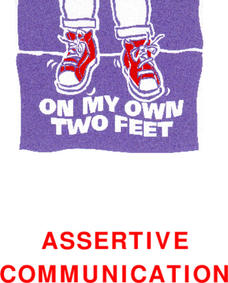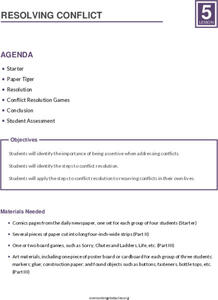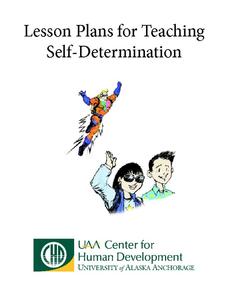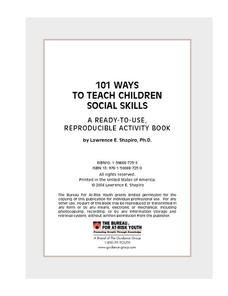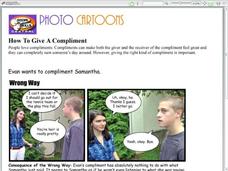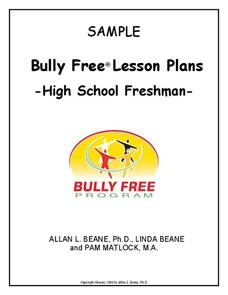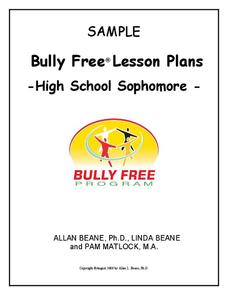King Country
Lesson 9: Communication - Day 2: Assertiveness
Appropriate assertive and non-verbal assertive communication is the focus of this lesson designed for the special education classroom. Using mirrors, class members practice assertive responses to a variety of situations.
Overcoming Obstacles
Being Assertive
Passive! Aggressive! Assertive!. The activities in the fourth lesson in the Communication module teach middle schoolers the difference among these behaviors and how to develop assertive communication skills. After defining and offering...
Overcoming Obstacles
Learning to Be Assertive
After defining passive, aggressive, and assertive, class members role-play different scenarios demonstrating these behaviors. Individuals then identify a weakness they wish to improve and, using what they have learned throughout the...
Department of Education (Ireland)
Assertive Communication
Assertive communication is an acquired skill. Teaching young people to ask for what they need and to believe that they have a right to ask is at the core of a unit on assertive communication. Over the course of the unit, middle and high...
Overcoming Obstacles
Using Communication Skills Effectively
Miscommunication is often the basis of conflict. To improve their communication skills, pupils first review what they learned about assertive (as opposed to aggressive or passive) communication, role-play several scenarios, and...
Ohio National Guard
Emotional Intelligence
Provide teenagers with the social skills they need to live happy lives with this collection of worksheets and activities. Covering a variety of topics from self-awareness and assertiveness, to stress management and problem solving, this...
Health Smart Virginia
Relationship Skills and Communication
Relationship and communication skills are the heart of a lesson that focuses on passive, aggressive, and assertive communication. After examining examples of each type, teams develop an assertive, win/win solution that resolves a conflict.
Overcoming Obstacles
Resolving Conflict
Win-lose, lose-lose, or win-win? The final lesson in the "Resolving Conflict Module" brings together all that participants have learned in the module. They first list and prioritize the steps in conflict resolution, then develop a plan...
Bully Free Systems
Bully Free Lesson Plans—11th Grade
It takes courage to stand up to bullies. Two sample lessons from a complete Bully Free curriculum, "Courageous and Brave Bystanders" and "Assertiveness Skills for Bullied Students and Empowered Bystanders" provide participants with...
University of Alaska
Lesson Plans for Teaching Self-Determination
How do we prepare kids, especially those with disabilities, for life after school, for the workplace, for independent living? This 96-page packet is loaded with self-assessment surveys, with skill builders, with information about rules,...
Council for the Curriculum, Examinations and Assessment
Relationships and Sexuality
The activities and discussions in this—the ninth in a series of 10 resources on Social, Physical, Emotional, Cognitive and Spiritual (SPECS) health—focuses on helping class members develop appropriate and healthy relationships....
Missouri Department of Elementary
Conflict Mediation – Part 1: Getting Ready
Two scholars walk into a room arguing, what is happening? Peers observe the two actors in preparation for a whole-class discussion about conflict. Learners establish a conflict, name the three approaches—passive, aggressive, and...
Bully Free Systems
Bully Free Lesson Plans—Fourth Grade
Two lessons detail what do if you are or see someone being bullied. The Four-Step STOP method features an assertive way to make school a bully-free zone. Tips offer advice to be a helpful bystander. A parent or guardian chat bridges the...
Health Smart Virginia
Communication
In preparation for a game in which they guess the type of communication used in a scenario, scholars examine and discuss the four types of communication: passive, aggressive, assertive, and passive-aggressive. Learners identify "I"...
Overcoming Obstacles
Expressing Opinions Constructively
Everyone has opinions. The trick is to learn how to disagree in a way that doesn't cause problems. The activities in the final lesson in the Communication Module focuses on learning how to express opinions constructively. Middle...
Guidance Group
101 Ways to Teach Children Social Skills
Increasing pressure to improve student achievement has made it easy to overlook the social skills they also need to develop. With this collection of worksheets and activities, you'll be able to improve children's...
Nemours KidsHealth
Peer Pressure: Grades 9-12
Peer pressure is not always negative. It can also inspire, encourage people to get involved, and help push change. Class members select a quotation from a provided list and craft a paragraph about the meaning of the statement, how it...
Health Smart Virginia
Mental Health/Social Emotional Skills
Looking for social-emotional resources? Check out this seven-page packet that includes activity and lesson plan ideas, as well as links to information resources that support the social and emotional development of tenth graders.
Health Smart Virginia
Summative Assessment
As a summative assessment of the Health Smart unit, middle schoolers create a five-chapter autobiography demonstrating what they have learned about self and social-awareness, decision-making, and communication skills.
Humanities Texas
A President's Vision: Theodore Roosevelt
Through an engaging, interactive experience analyzing primary sources, invite your young historians to take a closer look at the presidency of Theodore Roosevelt.
Social Skills Central
Photo Cartoons: How To Give A Compliment
Help learners develop the ability to offer appropriate, meaningful compliments to others—an essential social skill. Here you'll find a quick photo cartoon illustrating a right and wrong way to give a compliment, as well as a brief...
Bully Free Systems
Bully Free Lesson Plans—Ninth Grade
"Bullying and Prejudice" and "Do You Cyber Bully," two lessons from a complete Bully Free program, serve as samples of the approach used in a unit designed to bring awareness to and to combat bullying. Each lesson asks class...
Bully Free Systems
Bully Free Lesson Plans—10th Grade
Two lessons, "What Does Cyber Bullying Look Like?" and "Factors Influencing My Reporting the Bullying of Others," serve as examples of the 12 included in a Bully Free curriculum. Each plan includes discussion questions, an activity,...
Bully Free Systems
Bully Free Lesson Plans—12th Grade
Two sample lessons from a curriculum unit on bullying provide high school seniors with an opportunity to assess their online and cell phone behavior and to consider how they can offer support to bullied students. Each plan includes an...
Other popular searches
- Assertiveness Skills
- Assertiveness Training
- Teenagers and Assertiveness
- Assertiveness Situations
- Assertiveness Role Play
- She Assertiveness
- Pshe Assertiveness
- Lesson Plans Assertiveness
- Ps He Assertiveness
- Peer Pressure/ Assertiveness
- Assertiveness Skills, Girls



